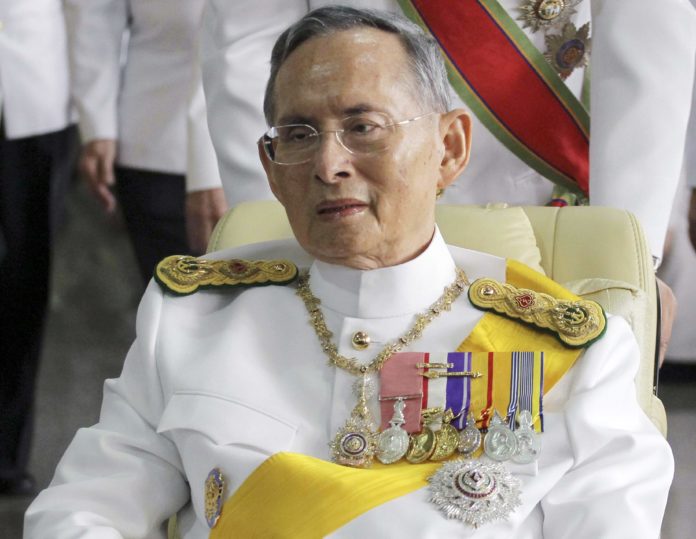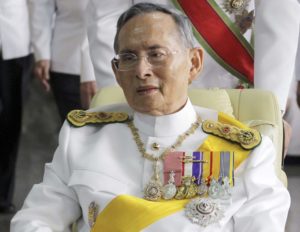Thailand’s King Bhumibol Adulyadej – the world’s longest-serving monarch, died at the age of 88, heralding a potential new bout of instability for the politically volatile country and its military rulers.
About Bhumibol Adulyadej :
Bhumibol Adulyadej known as King Bhumibol the Great, was the ninth monarch of Thailand from the Chakri Dynasty as Rama IX. Having reigned since 9 June 1946, he was, at the time of his death, the world’s longest-serving head of state and the longest-reigning monarch in Thai history, serving for 70 years, 126 days.
- In 1957, a military coup overthrew the unpopular government of Field MarshalPlaek Phibulsongkram with allegations of lèse majesté, which is an offense against the dignity of the monarch, punishable under Thai law.

- This began a new and long-lasting relationship between the monarch and military in governmental matters. Although Bhumibol did invite public criticism in a 2005 speech,the lèse majesté laws have not been revoked by the Thai parliament.
- Forbes estimated Bhumibol’s fortune—including property and investments managed by the Crown Property Bureau (CPB), a unique body that is neither private nor government-owned—to be US$30 billion in 2010, and he was the head of the magazine’s list of the “world’s richest royals” from 2008 to 2013. In May 2014, Bhumibol’s wealth was once again listed as US$30 billion. Officially the assets managed by the CPB are owned by the crown as an institution, not Bhumibol Adulyadej as an individual.
- After 2006, Bhumibol suffered declining health and spent extended periods atSiriraj Hospital. Bhumibol was generally highly revered by the people in Thailand —many even saw him as close to divine.
- His heir Vajiralongkorn does not share the popularity of his father, leading to concerns that the Thai monarchy will lose prestige and influence after Bhumibol’s death.
- In the early years of his reign, during the government of military dictatorPlaek Pibulsonggram, Bhumibol had no real power and was little more than a ceremonial figure under the military-dominated government.
- In August 1957, six months after parliamentary elections, General Sarit Dhanarajata accused the government of Field Marshal Pibulsonggram of lèse majesté due to its conduct of the 2,500th anniversary celebration of Buddhism.
- On 16 September 1957, Pibulsonggram went to Bhumibol to seek support for his government. Bhumibol advised the field marshal to resign to avoid a coup. Pibulsonggram refused. That evening, Sarit Dhanarajata seized power. Two hours later Bhumibol imposed martial law throughout the kingdom.
- Bhumibol issued a proclamation appointing Sarit as “military defender of the capital” without anyone countersigning the proclamation. It included the following:[
- Whereas it appears that the public administration by the government under the premiership of Field Marshal P. Phibunsonggram is untrustworthy, and that the government could not maintain the public order; and whereas the military, led by Field Marshal Sarit Dhanarajata, has successfully taken over the public administration and now acts as the Military Defender of the Capital;
- Now, therefore, I do hereby appoint Field Marshal Sarit Dhanarajata as the Military Defender of the Capital, and command that all the citizens shall remain calm whilst all the government officers shall serve the orders issued by Field Marshal Sarit Dhanarajat. This Proclamation shall come into force immediately. Done this 16th Day of September, Buddhist Era 2500 (1957).
Thailand :
- Capital: Bangkok
- Currency: Thai baht
- Prime minister: Prayut Chan-o-cha
AffairsCloud Recommends Oliveboard Mock Test
AffairsCloud Ebook - Support Us to Grow
Govt Jobs by Category
Bank Jobs Notification






